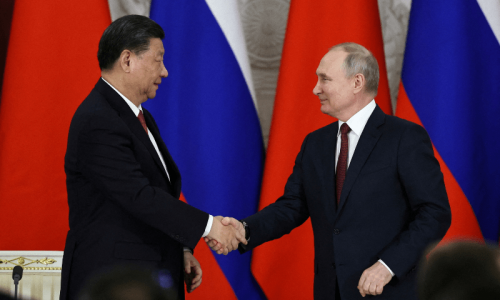PARIS: In sectors ranging from aviation to mobile communications, Europe has come from nowhere to challenge the United States where it once dominated.
Plane maker Airbus, founded in the late 1960s with the support of European governments, now sells more passenger jets than its rival, long-time market leader Boeing.
And GSM, a state-sponsored initiative of the late 1980s, has evolved to become the digital cellular standard, allowing Europe to leapfrog the United States in mobile penetration rates.
Now, experts are wondering if Europe may again be poised to catch the Americans napping — this time in space.
At the end of May, the European Space Agency announced it had secured backing from its member states to launch Galileo, an independent European satellite constellation that will rival the US military’s GPS global positioning system.
For a quarter of a century GPS satellites have hovered 20,000 kilometres above the earth’s surface, sending signals that are now essential for guiding mountain climbers, pilots and army generals alike.
In the war in Iraq, an estimated 60 percent of the bombs used by the United States were GPS-steered weapons.
And GPS-based timing information facilitates international financial transactions and plays a key role in the functioning of the Internet.
But GPS now looks vulnerable.
Because the United States has focused on its military applications, Europe is seizing an opportunity to build a new system tailored to civilians, which now outnumber military users 100-1.
In contrast to GPS, which is run by the Pentagon, Galileo will be run by civilians. It promises greater continuity and broader coverage than GPS, potentially giving it a leg up in key applications such as traffic management.
“The United States could end up ceding leadership in civil navigation to Europe,” said Jeffrey Bialos, former head of the US delegation for negotiations on GPS and Galileo and an official in the Clinton Pentagon.
SOVEREIGNTY AT STAKE: US officials have accused Europe of creating an unnecessary duplicate system and worry about plans to position Galileo signals on the same frequency used by GPS for military purposes.
These concerns reportedly led US Deputy Secretary of Defence Paul Wolfowitz to send a letter last year to European Union defence ministers warning that Galileo threatened NATO security interests.
Europe’s answer has been that Galileo will be a purely civil system. But comments from top European officials demonstrate that strategic considerations have been paramount in going ahead with the project.
In Dec 2001, the French president said European countries would become “vassals” of the US if they did not build their own navigation system.
More recently, wars in Kosovo and Iraq reinforced the notion in European capitals that continued dependence on GPS could compromise European sovereignty.—Reuters











































Dear visitor, the comments section is undergoing an overhaul and will return soon.